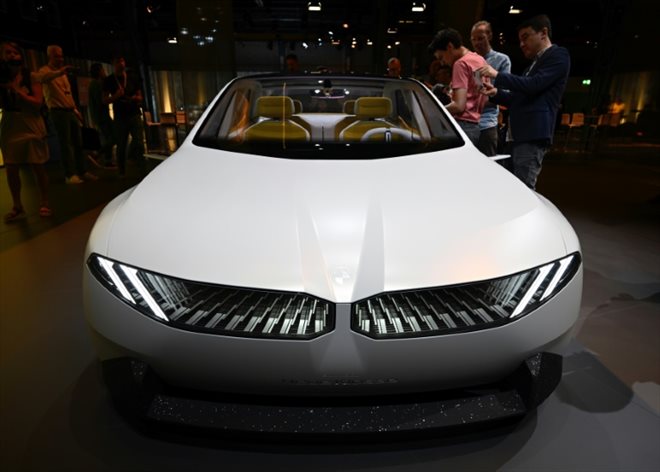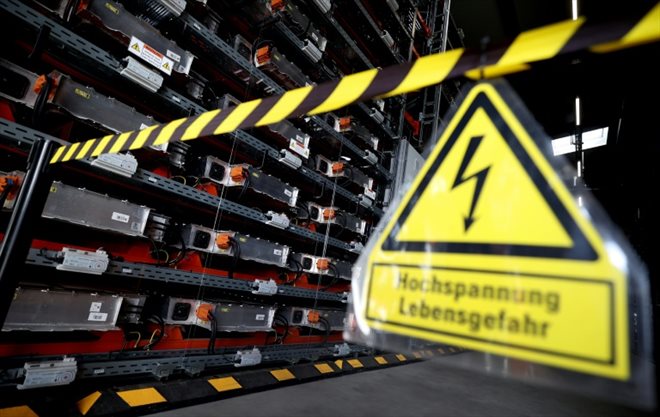The headquarters of the German car manufacturer BMW, May 10, 2023 in Munich, southern Germany (AFP/Archives/Christof STACHE)
The future of BMW’s electric cars rests in the hands of a Bavarian village, where a planned battery factory by the manufacturer is under debate, at a time when German industry must modernize to avoid decline.
In Strasskirchen, a quiet town an hour and a half from Munich, some 2,700 voters are called on Sunday to vote for or against the establishment of a mega-factory by the Bavarian automobile giant.
The project serves as a signal as German industry is going through a period of slump, faced with high energy costs and drying up order books from abroad.
Added to this are increasingly strict regulatory requirements and more attractive subsidies offered elsewhere, in the United States in particular, which are all vectors pushing entrepreneurs to review their “made in Germany” establishments.
BMW, for its part, intends to “invest several hundred million euros” in this factory “at the heart of the development of electric vehicles in Germany”, maintains Alexander Kiy, head of the Strasskirchen factory project at the manufacturer.
The planned site will ultimately employ more than 3,200 people and deliver 600,000 high-voltage batteries per year, which will then be installed in new electric models coming out of the Bavarian factories of Regensburg, Munich and Dingolfing, BMW’s largest European car plant.
– Arable lands –
Suffice it to say that a rejection of the project on Sunday would seriously compromise the planned launch around 2025 of the new range of electric vehicles from the manufacturer of the X3.

The German car manufacturer BMW presents its “Neue Klasse” project, an electric car concept, on September 2, 2023 on the eve of the opening of the Munich motor show (AFP/Archives/Tobias SCHWARZ)
As batteries are large and heavy, their production plants must be located as close as possible to vehicle assembly lines.
BMW is already applying this strategy for its factories abroad, in Hungary, the United States, Mexico and China.
The municipality of Strasskirchen was chosen by also meeting this proximity criterion. But a section of residents opposes the automobile giant, fearing that their rural territory, south of the Danube and the Bavarian Forest, will become an industrial zone, with an increase in road traffic.
“More than 100 hectares of prime arable land would be destroyed forever,” an error “from the perspective of climate change,” says Thomas Spötzl, 44, spokesperson for a movement that wants to stand up to BMW .
On the contrary, the manufacturer offers “an immense opportunity for the region to invest in sustainable technologies and jobs of the future”, replies Martin Götz, 45, native of Strasskirchen and spokesperson for an association supporting the project. ‘factory.
The two camps have been tearing each other apart for months.
– Reluctance –
“For Bavaria, and for the whole of Germany, it must still be possible to create a large industrial site of this type,” says Armin Soller, mayor of the neighboring village of Irlbach, also affected by the site planned by BMW.

Batteries at the factory of German car manufacturer BMW, October 20, 2022 in Leipzig (AFP/Archives/Ronny Hartmann)
But “there is a clear reluctance to create industrial sites in Germany”, underlines Milan Nedeljkovic, member of the BMW management board in charge of production.
However, the country “needs a commitment to economic growth, especially in times of energy and digital transformation,” he adds.
However, several large industrial projects have been announced in Europe’s largest economy in recent months, such as semiconductor manufacturing plants supported by world leaders in the sector.
Chancellor Olaf Scholz recently called on the regions, municipalities and even the parliamentary opposition to support a “German pact” to make the country more agile, dynamic, less bureaucratic, but this has not really convinced economic circles.
“We need a global concept that guarantees the maintenance of our competitiveness and our locations,” Arno Antliz, financial director of the giant Volkswagen, declared Monday to the press in Frankfurt.
A few days before the referendum, the mayor of Strasskirchen, Christian Hirtreiter, wants to believe that “the mood is now clearly for BMW”.
In the event of a favorable vote on Sunday, BMW would counter a movement of company defections in the canton.
Thus a paper factory in the neighboring industrial zone in Plattling, with 500 employees, announced its closure in July. High energy costs have been cited as the reason.
© 2023 AFP
Did you like this article ? Share it with your friends using the buttons below.




